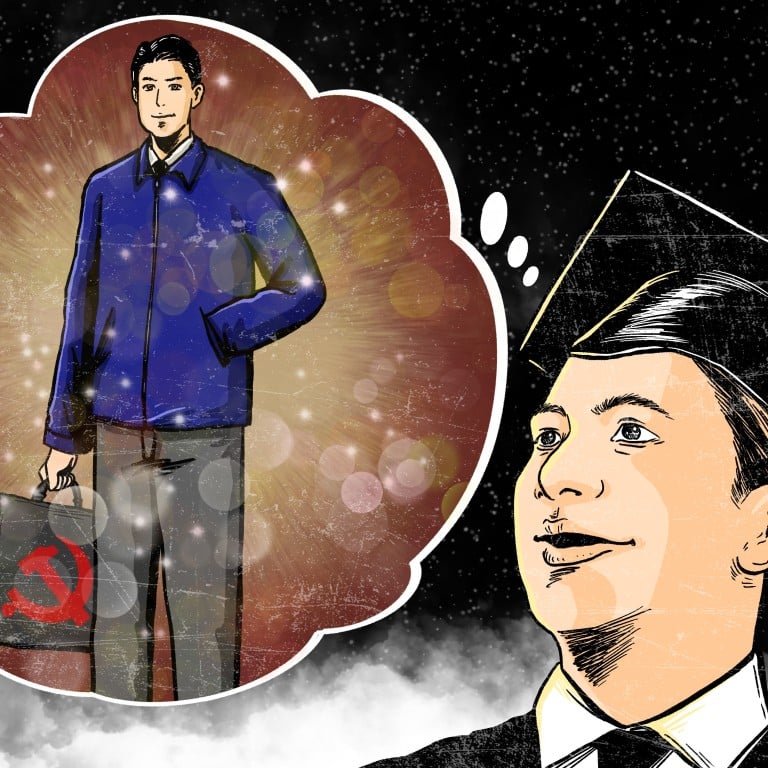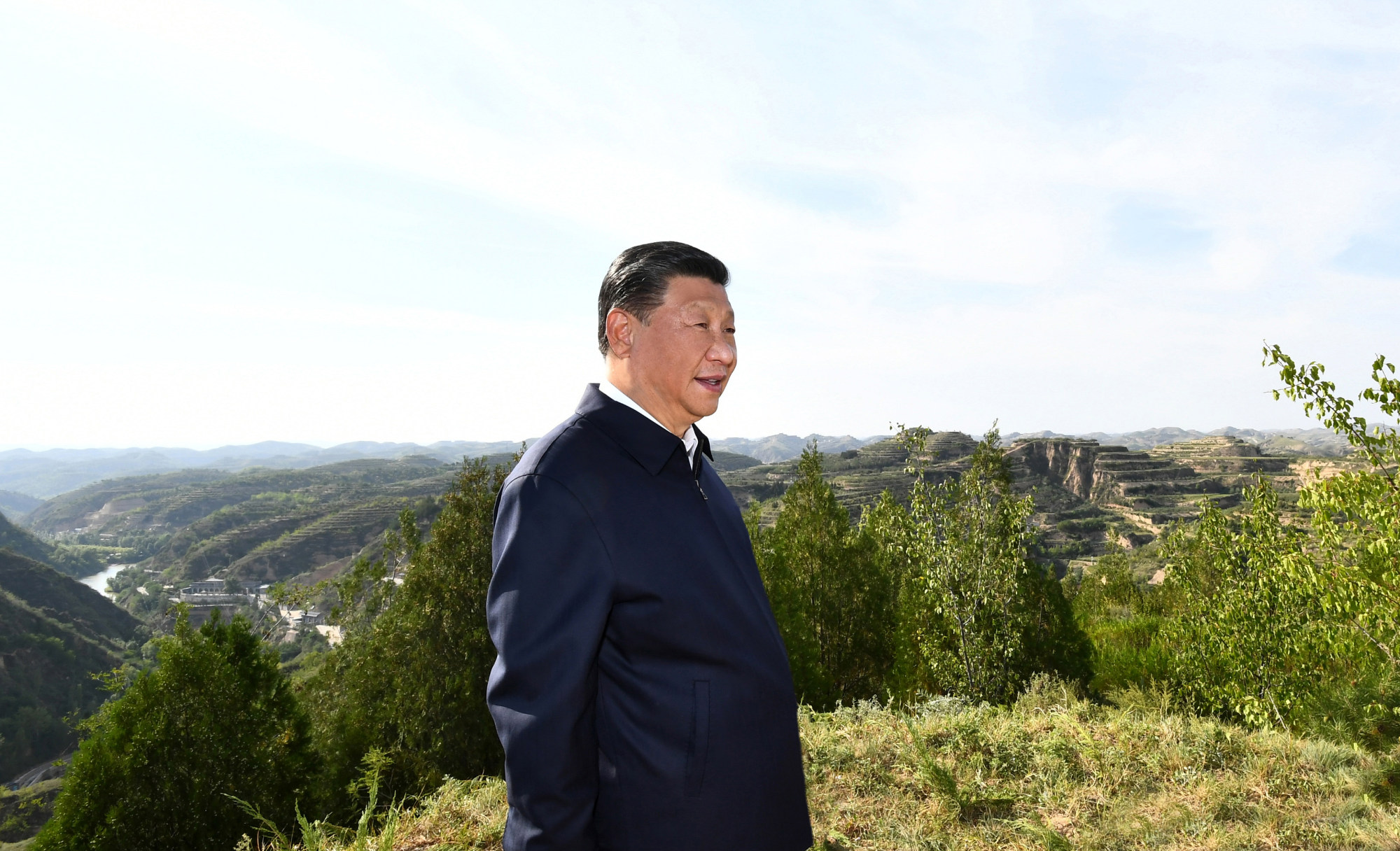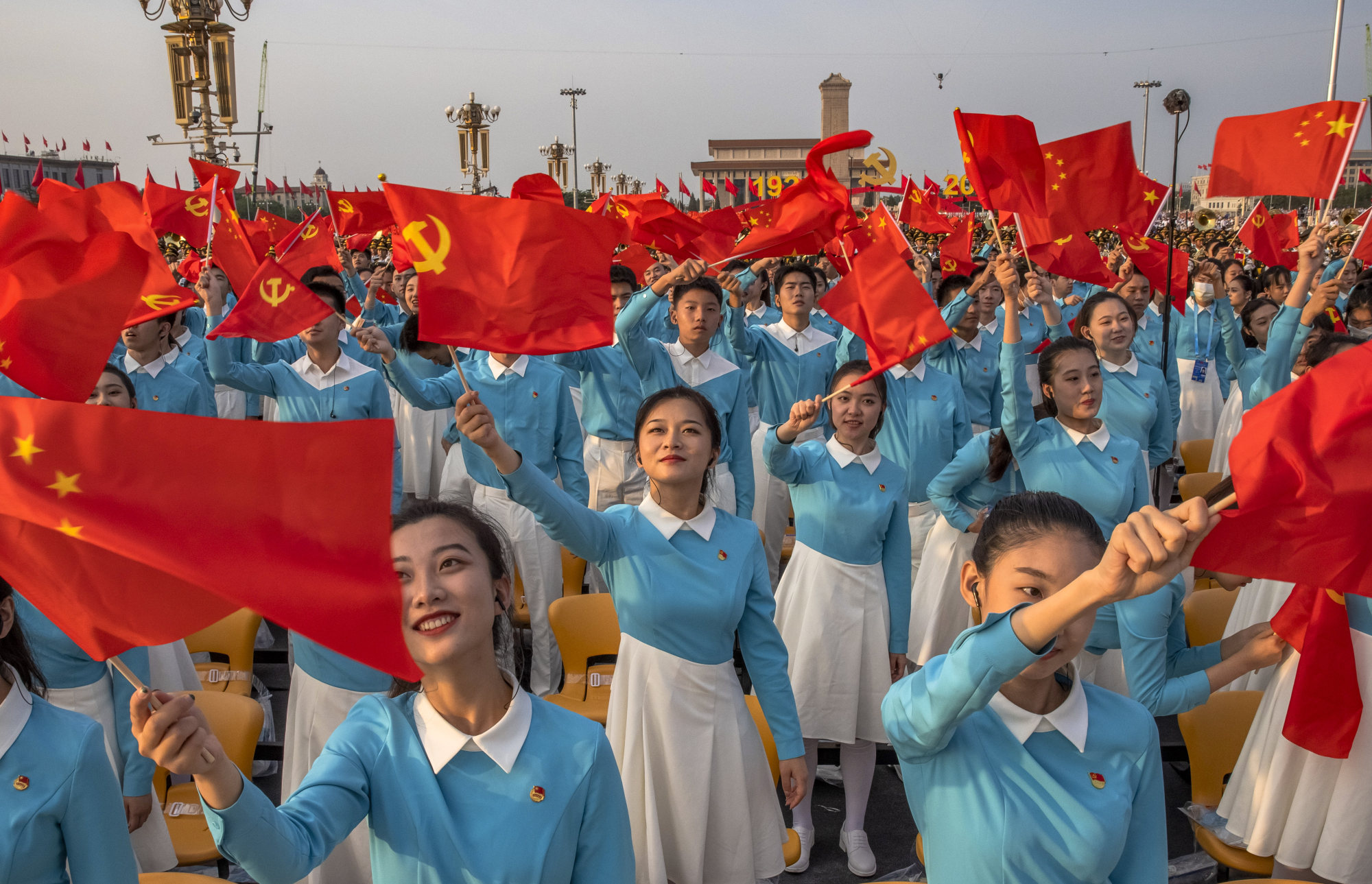
How Communist Party membership and state-sector jobs became fashionable choices for young Chinese
- Advice on dressing like a government official or party cadre attracts millions of clicks
- Retrenchments due to the pandemic have seen jobseekers focus on promise of stability
Beijing university student Kathy Yao takes occasional breaks from summer holiday preparations for the national civil service exams to check for social media posts on the latest fashion trend in mainland China – cadre style.
When I see pictures of young men in plain white shirts, blue windbreakers or black coats, they look neat and reliable
“I used to like oversized hip-hop clothes. But when I see pictures of young men in plain white shirts, blue windbreakers or black coats, they look neat and reliable. Merely viewing the pictures offers a sense of security during a time of turbulence.”
Previously regarded as functional rather than fashionable, cadre-style dress gained in popularity in recent years after the party persuaded young pop, film and television stars to publicly embrace communist values. However, it was Covid-19 that made it a fashion trend as people focused on stability amid fears about the disease and anxiety about China’s hardline pandemic control measures.

“My parents and grandparents always said being a civil servant is the best career in China, but I didn’t buy it,” Yao said. “The Covid-19 pandemic has convinced me of the merits of having a guaranteed lifestyle – stable income, good benefits and little chance of losing your job.”
Reduced incomes and unemployment have become common since the pandemic gathered pace in early 2020, with millions of private companies collapsing as production was disrupted and shops and restaurants were ordered to close. However, researchers say the pandemic did not hit all people and sectors evenly, with party members and those working for the state faring better.
The probability of having a reduced income was 0.53 for non-party members but 0.46 for party members, according to a paper by two sociologists, Yue Qian, from the University of British Columbia in Canada, and Wen Fan, from Boston College in the United States. They said it was 0.43 for state-sector workers but 0.54 for private-sector workers and 0.57 for the self-employed.
“Disaster provides a unique opportunity to examine the social distribution of deep-seated as well as emerging inequalities,” they wrote in the August 2020 issue of the journal Research in Social Stratification and Mobility.
Yue and Wen investigated the incomes of about 4,700 respondents around China in March and April 2020 and compared them with their income levels before the Covid-19 outbreak.
“Education, family income, Communist Party membership, state-sector employment, and urban hukou [household registration] – all long-standing status markers in China – shield one from Covid-19-related financial troubles. Pre-existing social inequalities are therefore magnified,” they wrote.
Twenty-year-old Howard Wang, who has just completed his second year of computer science studies at a Shanghai university, said the pandemic had made him see “how bad life can turn out to be”, and that the secure life promised by a government job would mean a lot in difficult times.
He said he had taken philosophy as a second major, in the hope that learning about Marxism and socialism with Chinese characteristics will be helpful in his application to become a party member.
“Being a party member and participating in some national science and technology programme is the best career path for me,” Wang said. “I used to favour big technology firms. But most big names are private companies. Regulatory requirements change rapidly and they are cutting staff.”
In a bid to “prevent the disorderly expansion of capital”, China launched a sweeping regulatory clampdown on the technology sector last year, with internet platforms punished for violating antitrust regulations and abusing the collection of data to exploit consumers or inadvertently undermine national security. The clampdown has eased this year, with China looking to revive an economy hit hard by the pandemic, but a more heavily regulated environment still limits the tech sector’s upside potential.
“The regulatory storm may be passing the technology giants for now, but the golden age of growth is firmly in the past,” said Ernan Cui, an analyst with Gavekal Dragonomics.
Apart from the tech sector, Chinese authorities have also launched crackdowns on private education, internet finance and the property sector – all big creators of jobs in the past. Many companies collapsed following the crackdowns, and some have transformed. New Oriental Education & Technology Group, one of the largest companies affected by Beijing’s crackdown on private tutoring, said it dismissed 60,000 employees last year. It is trying to find a lifeline in e-commerce live-streaming, with former teachers reciting poems, singing English songs or playing the guitar while selling products ranging from books to farm produce.
Jobseekers are shunning the risky private sector. According to survey results released in April by recruitment platform Zhaopin.com, 44 per cent of new graduates this year want to join SOEs and 26 per cent favour government-affiliated companies or government departments. Only 17 per cent said they were interested in working for a private company, while the remaining 13 per cent preferred foreign-funded firms.
The number of people making government and public sector jobs their top career choice doubled last year and has continued to rise this year, according to Zhaopin.
Why China’s elite graduates are saying goodbye to the dream job
Chen Daoyin, a political scientist and former professor at Shanghai University of Political Science and Law, said people were more likely to prefer government jobs and the state sector after experiencing government rationing of resources and shortages of food and healthcare necessities when under lockdown.
“After the lockdowns, people are more aware of what the power of the Chinese government can achieve,” Chen said. “There will be more young people who want to be a part of the [party and government] system. And there’ll be more people applying for civil servant positions.
“A lockdown is, in nature, a process of the government’s taming of the people.”

Luna Wu, who is waiting to find out whether she will be admitted to a foreign relations college in Beijing, said she wants to become a party member.
“Cadres in our community worked day and night during the lockdown period this spring. I was moved by their dedication,” the 18-year-old said. “I want to be a party member so that I can serve the people, especially in a time of crisis.
“My dream is to become a foreign ministry spokesperson who can confidently rebuke the West over its groundless accusations. Being a party member is a prerequisite.”
Many economists have warned that China’s focus on state enterprises, with government controlling the “commanding heights” of the economy, will reduce the economy’s long-term growth potential and discourage production and innovation in the private sector, which contributes more than half the country’s tax revenues, 60 per cent of its gross domestic product, 70 per cent of technological innovations and 80 per cent of urban jobs.

